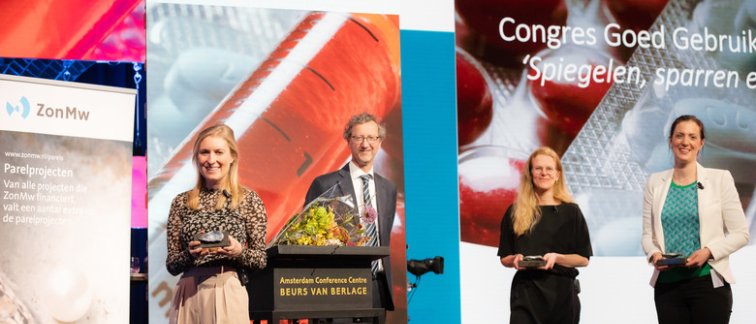Tips and tools
Mira, Irma, Hans and Ronella want to further enable scientific research in children. They have developed different types of products to achieve this, e.g. a comic book explaining what scientific research entails. All products can be found on www.kindenonderzoek.nl (Dutch only). On this website children and their parents can find what the process is of scientific research and the experiences of other children. Researchers can find tips and tools on how to involve children and their parents in their research. With these products the research group hopes that parents will be more quick to permit their children into participating in research, and that children can easier decide whether to participate in a study. Irma Hein, department of child- and adolescent psychiatry: “This pearl, is an enormous honor. I hope it also becomes more known that scientific research in children can be performed in a good manner and more people will be participating.” Hein hopes that in the future children will be seen as a full-fledged partner in research. “That they will be involved and get a bigger voice.”
Unchartered territory
Drug research in children is still unchartered territory. Ethical obstacles or risks on the side effects will hinder this type of research. And frequently there are practical problems, such as getting permission from the parents, who are often hesitant. Pediatrician Hans van Goudoever believes we are missing opportunities, while the importance of drug research in children is evident. “Only approximately half of the prescription drugs have been researched in children. Thereby we have an insufficient understanding of their effect. Children are not mini size adults, their bodies function in a different way. Thus if we want to be able to administer the drugs in a safe and good manner we have to do scientific research.”
Broader importance
The research group believes that the importance of scientific research in children is even broader. Psychiatric issues often start at a young age. Doing a proper investigation on how certain issues arise in children’s growth and adolescents is just as relevant as drug research. Another terrain where the participation of children would be of value, is the development of medical tools. For instance, an insulin pump that in practice was not suitable for small children’s hands. Also in this case would the participation of children in the developmental phase have prevented issues.
Just ask
Van Goudoever believes that the various research projects and the collection of results on www.kindenonderzoek.nl has raised awareness among the medical professionals and researchers. “Now we are more aware that children are able to make a decision regarding scientific research. And often they like to participate. Doctors and medical-ethical committees do not have to be so hesitant. You can just ask the children and parents.” According to ZonMw the research group is justly proud of the result: a one-stop platform where all people involved – children, parents, professionals and researchers – can find all the relevant information.

